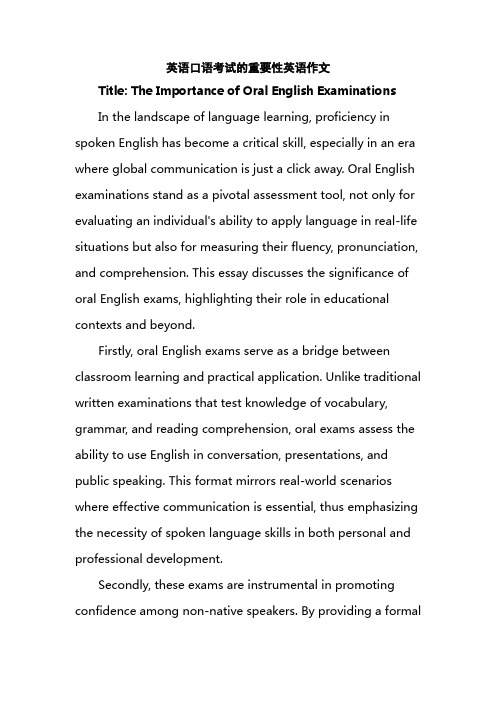2020年英语四级作文题目:口语的重要性
英语口语的重要性介绍

【导语】想要提⾼⾃⼰的英语⼝语能⼒,好的学习⽅法和不断的努⼒是必须的。
但是很多⼈都没有掌握好的⽅法,导致⼝语能⼒⼀直得不到提升。
以下是⽆忧考整理的英语⼝语的重要性介绍,欢迎阅读!1.英语⼝语的重要性介绍 1、有助于词汇积累 对于某些同学来讲,学习英语是枯燥的事情。
背单词、背句⼦、背语法、做练习题,⼤⼤降低了同学们对学习英语的兴趣。
从英语⼝语的⾓度切⼊英语学习,却是别有⼀番天地。
对于有些不容易记住的单词,学⽣可以在⼝语练习中,将其放在语句和段落中进⾏记忆。
同时,在⼝语训练中,学⽣可以接触许多⽣词词句,丰富英语词汇量。
2、有助于提⾼⼝语表达 语⾔的学习离不开模仿,学⽣想要掌握⼀⼝地道的英语,需要在初期训练时注意英语发⾳。
英语⼝语的另⼀重要性在于可以帮助学⽣练习英语发⾳,在不断地练习中,帮助学⽣冲破⼼理障碍,变得更加⾃信。
当学⽣对⾃⼰的语⾳、语调有⾃信后,才会更加乐于⼤声朗读或者朗诵英语,最终能够帮助学⽣提⾼英语⼝语表达能⼒。
3、有助于培养英语语感 语感在语⾔学习中的地位不⾔⽽喻,可以说,英语语感是我们在英语学习中要达成的最终⽬标。
英语⼝语训练,有助于培养学⽣的语感。
当我们融⼊到英语⼝语的学习中时,会发现⾃⾝英语能⼒,英语思维都在不断进步。
这都得益于英语⼝语的学习,因为⼝语通过视听结合的⽅式,帮助同学记忆语⾔结构,帮助英语语感的养成。
2.英语⼝语问答要点 1.⾼级的回答在最后点明 ⼀般考题中很多都是带有⾼级的。
考⽣不管采⽤何种拓展⽅式,⼀定要在最后点出题⽬的回答重点即“最为……的是……”,不要说了⼀⼤堆,最后重点没说。
2.地域性的问题要有具体的细节地⽅ 有些考题有明确的地域性规定,⽽在考场中,经常有学⽣忽略这些限制,泛泛⽽谈,⼀直到过,就很容易失分了。
3.修饰语要紧扣考题 考题中的修饰语很容易被考⽣错过,⽽⼩⼩的形容词就已经点明了考题的回答⽅向,经常被考⽣当作不会影响对考题理解的词⽽⾃动过滤掉。
英语口语的重要性

英语口语的重要性英语口语的重要性英语学习过程中,听说读写都分不开,所以每一个学习环节都非常重要,英语口语自然也不例外。
下面店铺跟你聊聊英语口语的重要性。
英语口语的重要性篇1在中国填鸭式的应试教育下,对于部分同学来说,学习英语是一个挺枯燥的事情。
每天默单词,背课文,平常交流也用不上英语,这些因素可以说也大大降低了同学对英语的兴趣和使用英语口语来交流的频率。
但国家开设英语课程,重视英语学习,是在全球化加剧,您的工作,商务,出国等等都离不开英语的前提下,从而我们有必要学习英语口语来为我们将来适应社会鉴定良好的语言基础。
同时,您在学习英语口语的过程也会收获很多。
第一,口语能够帮助学生丰富词汇量。
孤立的单词不容易记,而语句、文章是有情节的,词放在句子里,联系上下更便于识记。
学生经常练习口语,接触到的生词、句式日益增多。
这对学生灵活运用常用词以及短语十分有益。
第二,口语能提高口语表达能力学英语只有开始时就注意语音、语调,大胆效仿,及时纠正口型和舌位,才能讲出标准的英语,对于学员的英语口语表达能力的培养,口语训练就更为重要了。
其作用有二:其一,如前所述,口语训练有助于学生冲破心理障碍。
学生敢于大声口语英语课文,就敢于开口说英语。
经过学习和练习,学生将不再是会英语的“哑巴”。
其二,反复大声口语英语课文,特别是长期坚持以后,能够使学员形成一定的语感,并初步养成用英语思维的习惯。
第三、口语训练有助于培养学生的语感学习语言就必须培养语感,语感对学好一门语言起了很重要的作用。
语感它强调通过对语言文字的直觉感受,最终达到语言文字快速领悟的境界,是构成一个人英语素质的核心因素。
而语感是由后天的培养而产生起来的,在言语实践中,听觉、视觉等各种感官通过与语言材料的接触中,不断积累语言知识,体会出其语音、语义、语调及语气,日积月累,便逐渐培养了对语言的感知。
第四,口语可以促进学员听力和思维能力的发展教师范读或播放课文录音,能使学生保持高度的注意力,唤起他们的感知和想象。
英语口语考试的重要性英语作文

英语口语考试的重要性英语作文Title: The Importance of Oral English ExaminationsIn the landscape of language learning, proficiency in spoken English has become a critical skill, especially in an era where global communication is just a click away. Oral English examinations stand as a pivotal assessment tool, not only for evaluating an individual's ability to apply language in real-life situations but also for measuring their fluency, pronunciation, and comprehension. This essay discusses the significance of oral English exams, highlighting their role in educational contexts and beyond.Firstly, oral English exams serve as a bridge between classroom learning and practical application. Unlike traditional written examinations that test knowledge of vocabulary, grammar, and reading comprehension, oral exams assess the ability to use English in conversation, presentations, and public speaking. This format mirrors real-world scenarios where effective communication is essential, thus emphasizing the necessity of spoken language skills in both personal and professional development.Secondly, these exams are instrumental in promoting confidence among non-native speakers. By providing a formalsetting to practice and showcase their spoken English, learners can identify areas of improvement and work towards enhancing their language skills. This process not only boosts their self-assurance in using English but also prepares them for various international settings where English is the medium of communication.Moreover, success in oral English exams often opens doors to broader opportunities. In the academic realm, it can be a prerequisite for admission into English-speaking universities or for certification programs. Beyond education, proficiency in spoken English is highly valued in the international job market, making it a key factor in securing employment with multinational corporations or participating in global collaborations.Oral English exams also play a crucial role in maintaining standards and quality in language education. They provide educators with insights into the effectiveness of their teaching methods and materials, enabling them to make adjustments that better equip students with the required skills. Additionally, these exams encourage a culture of continuous learning, as mastery of spoken English is a journey rather than a destination.However, it is pertinent to acknowledge that while oral English exams are significant, they should not overshadow the importance of other language skills. Balanced language education that incorporates reading, writing, and listening alongside speaking is essential to cultivate well-rounded language abilities.In conclusion, oral English exams hold a vital place in language learning, serving as a link between theoretical knowledge and practical usage. These exams not only evaluate an individual's spoken language capabilities but also boost confidence, open doors to opportunities, and maintain educational standards. As we navigate through the dynamics of global communication, the relevance of oral English exams continues to grow, underscoring the importance of investing in spoken language proficiency for personal and professional growth on the global stage.。
口语重要性及如何提升它 英语作文

口语重要性及如何提升它英语作文全文共3篇示例,供读者参考篇1The Importance of Oral English Skills and How to Enhance ThemAs a student in today's globalized world, having strong oral English skills is more crucial than ever before. Effective communication is the bedrock of success in academics, professional life, and personal relationships. While written English proficiency is undoubtedly valuable, the ability to express oneself confidently and articulately in spoken English can open doors to a plethora of opportunities.The significance of oral English skills cannot be overstated. In the realm of academics, class participation, group discussions, and presentations require students to articulate their thoughts and ideas clearly and concisely. Proficiency in spoken English allows students to engage fully in the learning process, ask insightful questions, and contribute meaningfully to intellectual discourse. Furthermore, many prestigious universities and graduate programs place a strong emphasis on oralcommunication skills during the admissions process, making it a critical asset for aspiring students.In the professional arena, oral English skills are an invaluable asset. Meetings, negotiations, and client interactions often necessitate the ability to communicate effectively in real-time. Individuals with strong oral skills are better equipped to convey their thoughts persuasively, build rapport, and navigate complex situations with confidence. Moreover, as businesses become increasingly global, the ability to communicate across cultural barriers and in diverse settings is highly sought after by employers.On a personal level, oral English skills can enrich one's social life and cultural experiences. Engaging in conversations with native speakers, participating in social gatherings, and immersing oneself in English-speaking communities can broaden one's perspective and foster meaningful connections. Additionally, the ability to express oneself clearly and confidently in spoken English can boost self-esteem and personal growth.While the importance of oral English skills is evident, developing and improving them can be a challenging endeavor. However, with dedication and the right strategies, students canenhance their spoken proficiency and reap the numerous benefits that come with it.One of the most effective ways to improve oral English skills is through immersion and practice. Seeking opportunities to engage in conversations with native speakers, joining language exchange programs, or participating in English-speaking clubs or societies can provide invaluable practice and exposure. Additionally, consuming English-language media, such as movies, TV shows, podcasts, and audiobooks, can help train the ear and familiarize oneself with various accents, idioms, and conversational nuances.Another crucial aspect of improving oral English skills is building confidence and overcoming anxiety. Many students feel self-conscious or nervous when speaking in English, which can hinder their fluency and expressiveness. To combat this, it is essential to cultivate a growth mindset and embrace mistakes as opportunities for learning. Practicing in front of a mirror, recording oneself, and seeking constructive feedback can help identify areas for improvement and boost self-assurance.Expanding one's vocabulary and understanding of idiomatic expressions is also crucial for effective oral communication. Regularly incorporating new words and phrases intoconversations, reading extensively, and actively engaging with English-language materials can aid in this endeavor. Additionally, studying the cultural context and nuances associated with certain expressions can enhance one's ability to communicate in a culturally appropriate and authentic manner.Furthermore, developing active listening skills is anoften-overlooked aspect of oral communication. Effective listening involves not only comprehending the words spoken but also interpreting tone, body language, and contextual cues. By actively listening during conversations, students can better understand and respond appropriately, fostering more meaningful and productive exchanges.Lastly, seeking guidance and feedback from language instructors, native speakers, or language partners can be invaluable in the journey to improving oral English skills. These individuals can provide personalized feedback, identify areas for improvement, and offer strategies tailored to individual needs and learning styles.In conclusion, the importance of oral English skills in today's interconnected world cannot be understated. Whether in academics, professional settings, or personal endeavors, the ability to communicate effectively in spoken English opens doorsto numerous opportunities and enriches one's overall experience. By embracing immersion, building confidence, expanding vocabulary, developing active listening skills, and seeking guidance, students can embark on a transformative journey towards mastering oral English proficiency. The rewards of this journey extend far beyond language acquisition, fostering personal growth, cross-cultural understanding, and the ability to navigate and thrive in diverse environments.篇2The Vital Importance of Oral English Skills and Strategies for Self-ImprovementAs an English student, I can't overstate how crucial it is to develop strong oral communication abilities. Sure, we spend tons of time learning grammar rules, expanding our vocabulary, and dissecting written texts. But at the end of the day, being able to express ourselves clearly and confidently through speech is one of the most valuable skills we can cultivate.Think about it – in our daily lives and future careers, we'll constantly be interacting with others through conversation. Whether it's class discussions, job interviews, presentations, or casual chats with friends and colleagues, oral English proficiencyopens up so many opportunities. Good spoken skills can help us make great first impressions, articulate our thoughts persuasively, and connect with people from diverse backgrounds.On the flip side, struggles with oral English can be incredibly frustrating and limiting. I know from experience how disheartening it feels to freeze up during a conversation, stumbling over words and losing my train of thought. It chips away at your confidence and can make you hesitant to speak up, which is the last thing we need as learners. After all, taking chances and making mistakes is how we grow.The good news is that with consistent practice and the right strategies, anyone can make massive strides in improving their oral English abilities. As someone who has been on that journey myself, here are some key tips that have helped me along the way:Immersion through media and conversation partnersThey say the best way to learn a language is through immersion, and I couldn't agree more when it comes to oral skills. Listening to as much English media as possible – movies, TV shows, podcasts, audiobooks, you name it – trains your ear to thenatural rhythms and cadences of spoken English. It's like a workout for your listening comprehension muscles.Even better is finding conversation partners to actually practice speaking with on a regular basis. Look for language exchange groups in your area or online where you can chat with native or highly proficient English speakers. Talking with someone who can gently correct you and give feedback is invaluable.Shadowing and recording yourselfA simple but powerful technique is shadowing, which involves listening to a native speaker and immediately repeating what they said, trying to match their pronunciation, intonation, and pacing as closely as possible. It feels a bit silly at first, but helping your mouth form those sounds is so beneficial.To take it a step further, record yourself speaking and listen back to the recordings. We all have blind spots when it comes to our spoken English quirks and stumbling blocks. Hearing yourself allows you to catch things you may not notice in the moment, and pay closer attention to aspects like filler words, unnatural pacing, or problem areas with pronunciation.Pushing through the fearLet's address the elephant in the room – a major obstacle to improving oral English is simply feeling too self-conscious or afraid to speak up. Our brains have this annoying habit of going blank when we're put on the spot, no matter how prepared we might be.The antidote is to lean into that discomfort through practice, practice, practice. Seek out any and every opportunity to speak English, even if it's just casually chatting about your day with a language partner. Putting yourself out there gets easier each time, slowly retraining those mental pathways.It's also wise to remind yourself that native speakers understand you're still learning, and some slip-ups are to be expected. Embrace those small victories when you successfully convey a message or recover smoothly from a mistake. Over time, the fear gradually dissipates and gets replaced byhard-earned confidence.Reading aloud and emulatingAnother go-to strategy is reading passages out loud, focusing on proper pronunciation, rhythm, and expression. Start with simple reading materials then work your way up to more complex texts like novels or scripts. When reading dialogue between characters, try adopting slightly different voices andinflections for each one. Getting into the habit of emulating various speaking styles builds important oral muscles.For extra credit, record yourself and compare it to an audio version read by a native speaker. Zero in on the discrepancies and keep practicing areas that give you trouble. Reading aloud also pumps up your reading comprehension skills – a nice side benefit!Expanding your real-world speaking opportunitiesAt a certain point, you'll reach the limit of how much you can improve your oral English without putting it into real-world practice. Finding opportunities to use the language for actual communication is crucial.This could mean joining an English speaking club or attending social meetups. Ask your English instructors if there are any conversation partners, tutoring programs, or places you can volunteer using your oral skills. If opportunities seem scarce, get creative! Introduce yourself to English speakers in cafes, stores, anywhere you can strike up a casual conversation.Whenever someone offers to help improve your English, take them up on it. Ask them for candid feedback about things like your pronunciation, vocabulary usage, or areas that comeacross as unnatural or confusing. We all need that honest outside perspective sometimes.Keep it fun and find your flowThroughout this process, it's key to make speaking practice an enjoyable, low-stress experience whenever possible. Watch movies or shows you genuinely love. Discuss topics that fascinate you with conversation partners. Play word games, tell jokes and stories, karaoke – whatever keeps you feeling engaged and motivated.One of the beautiful things about language learning is that we each have our own unique voice and personal flow when we get into a groove. Maybe you have a talent for witty banter. Or perhaps you're an eloquent storyteller who can spin a riveting narrative. Finding and developing your own speaking style makes the hard work feel a lot less like work.I'm still a long way from true mastery, but focusing on these oral tactics has already made a world of difference in my English abilities and self-assurance. It's been a stark contrast from those early years of just grinding through grammar drills and reading exercises, only to stumble and freeze up any time I had to form full sentences out loud.If there's one key takeaway, it's this: oral skills deserve dedicated practice and shouldn't be an afterthought. In fact, I'd argue they're the most important aspect of achieving true English fluency and proficiency. After all, for most of us, the entire reason we're learning this global language is to connect and communicate more effectively with others.With perseverance and smart strategies, anyone can transform from someone who struggles to speak into an orator able to captivate audiences. I'm living proof that it's an eminently achievable goal. So keep putting yourself out there, embrace the stumbles, and enjoy the incredibly rewarding journey of finding your voice.篇3The Importance of Speaking Skills and How to Boost ThemAs a student, I can't overstate how crucial speaking skills are for academic success and overall personal growth. We live in a world where effective communication is the backbone of nearly every aspect of life, from acing presentations and group projects to nailing job interviews and professional interactions. Unfortunately, many students, myself included, often overlook the significance of honing our verbal communication abilities,primarily relying on writing skills to sail through educational endeavors. However, I've come to realize that neglecting speaking prowess can severely hinder our potential and impede our journey towards becoming well-rounded individuals.Let's start with the academic realm. Classroom discussions, debates, and presentations are an integral part of the learning experience, providing platforms for us to express our ideas, engage in critical thinking, and demonstrate our understanding of course material. Possessing strong speaking skills enables us to articulate our thoughts clearly, confidently, and persuasively, leaving a lasting impression on our professors and peers. Furthermore, many courses incorporate group projects, where effective verbal communication is paramount for collaborative success, as it facilitates the exchange of ideas, resolution of conflicts, and seamless teamwork.Beyond the classroom, proficient speaking abilities are an invaluable asset in our personal and professional lives. In social situations, they allow us to build meaningful connections, engage in thought-provoking conversations, and leave a positive impact on those around us. As we venture into the professional world, interviewing skills, public speaking proficiency, and the ability to communicate ideas effectively during meetings andpresentations can be the deciding factors in securing coveted job opportunities and advancing our careers.Recognizing the immense value of speaking skills, I've embarked on a journey to enhance my verbal communication abilities. While the path to improvement is challenging, it's undoubtedly rewarding and essential for personal and professional growth. Here are some strategies I've implemented:Practice, practice, practice: The age-old adage "practice makes perfect" holds true for developing speaking skills. I've made a conscious effort to seize every opportunity to speak up, whether it's participating in class discussions, joining debate clubs, or simply engaging in casual conversations with friends and family. The more I practice, the more comfortable and confident I become in expressing myself verbally.Active listening: Effective communication is a two-way street, and active listening is just as crucial as speaking. By focusing intently on what others are saying, processing their words, and responding thoughtfully, I not only improve my comprehension but also enhance my ability to formulate coherent and relevant responses.Expanding vocabulary: A rich vocabulary is a powerful tool for effective communication. I've made it a habit to learn newwords regularly, incorporating them into my daily conversations, and exploring their nuances and appropriate usage. This endeavor has not only boosted my speaking skills but also enriched my writing abilities.Seeking constructive feedback: Asking for honest feedback from trusted sources, such as professors, mentors, or peers, has been invaluable in identifying areas for improvement. By actively seeking input and implementing suggested corrections, I've been able to refine my speaking style, correct common mistakes, and enhance my overall delivery.Embracing public speaking opportunities: While the thought of public speaking can be daunting, I've learned to embrace these challenges as opportunities for growth. By participating in events like debate competitions, poetry slams, or even informal classroom presentations, I've gained invaluable experience in projecting my voice, managing stage fright, and captivating audiences.Observing effective speakers: Learning from role models is a powerful tool. I've made it a point to observe and analyze the speaking styles of individuals I admire, from renowned public figures to eloquent professors. By studying their techniques, such as body language, tone, and rhetorical devices, I've beenable to incorporate effective strategies into my own communication style.Utilizing multimedia resources: In our digital age, countless resources are available at our fingertips. I've leveraged online tutorials, podcasts, and TED Talks to learn from experts in the field of public speaking and communication. These resources offer valuable insights, tips, and real-life examples that have aided my journey towards becoming a more confident and articulate speaker.The road to mastering speaking skills is a long and continuous journey, but the rewards are immeasurable. As I progress, I've noticed a significant improvement in my ability to express myself clearly, think on my feet, and engage audiences. These skills have not only boosted my academic performance but have also enhanced my confidence and self-assurance in various aspects of life.In conclusion, speaking skills are an invaluable asset that should never be underestimated. They enable us to communicate effectively, build meaningful connections, and unlock countless opportunities for personal and professional growth. By embracing the strategies outlined above and committing to consistent practice, we can embark on atransformative journey towards becoming confident and articulate communicators, equipped to navigate the complexities of academic and professional landscapes. Remember, the power of the spoken word is immense, and mastering it can open doors to a world of possibilities.。
英语口语的重要性与必要性

英语口语的重要性与必要性英语作为一门全球通用的语言,其口语能力在现代社会中变得越来越重要和必要。
无论是在个人生活中还是职业发展中,具备良好的英语口语能力都能带来诸多优势和机会。
本文将探讨英语口语的重要性和必要性,并举例说明其在不同领域的应用。
首先,英语口语的重要性在于它是人际交往的基础。
通过流利地和他人交谈,我们能够建立起更紧密的人际关系,加深彼此的了解和合作。
无论在旅游中与当地人交流,还是在国际会议中与外国代表讨论,良好的英语口语能力都能使我们更加自信地表达自己的观点和需求,促进跨文化交流和合作。
其次,英语口语能力对求职和职业发展至关重要。
在竞争激烈的职场中,具备优秀的英语口语技巧将会让我们胜出。
许多跨国公司要求员工具备良好的英语口语能力,以便与国际团队合作、与客户沟通和开拓新市场。
掌握英语口语技巧能够扩大我们的职业机会,提升我们在职场中的竞争力。
此外,良好的英语口语能力还有助于升职和提高薪资,因为我们可以更好地与上级和同事沟通,展示自己的能力和价值。
再者,英语口语能力对于学习其他学科和获得国际教育机会也是必要的。
许多国际学校和大学的课程都是以英语为授课语言。
如果我们没有良好的英语口语能力,将会极大地限制我们学习其他学科的机会。
通过掌握英语口语能力,我们可以更好地理解和吸收外国学者和专家的知识和经验,拓宽我们的学术视野。
此外,通过参与国际学生交流项目,我们可以与来自世界各地的同学交流,加深对不同文化和观点的理解。
此外,英语口语的重要性还体现在旅游和文化体验中。
如今,越来越多的人选择出国旅游,而英语则成为了沟通的纽带。
通过掌握英语口语能力,我们可以更加深入地了解当地文化、与当地人交流、解决问题和享受旅游体验。
在旅游中,良好的英语口语能力能够为我们提供更多的便利,使我们的旅程更加丰富而愉快。
综上所述,英语口语的重要性和必要性在当今社会无可忽视。
它不仅是人际交往的基础,还是求职和职业发展的关键,对学习其他学科和获得国际教育机会也至关重要。
口语能力的重要性以及如何培养英语作文

口语能力的重要性以及如何培养英语作文全文共6篇示例,供读者参考篇1The Super Awesome Importance of Speaking English Well (And How to Get Better At It!)Hi there! My name is Alex and I'm a 5th grader. Today I want to talk to you about something super important - being able to speak English really well. Speaking English is kind of like a superpower. With great English skills, you can make friends from all over the world, learn about new cultures, and unlock tons of awesome opportunities!Why Speaking English Matters - The Superhero ReasonsYou can talk to people everywhere! English is spoken in so many countries. If you can speak it well, you'll be able to communicate with kids from the USA, UK, Australia, India, and loads of other places. How cool is that?You can learn anything. So much information on the internet and in books is written in English. The better your English, themore you can discover about any topic that interests you - from dinosaurs to video games!Awesome job opportunities. Many of the best jobs require excellent English skills to communicate with customers, colleagues or do things like write reports. The better you speak English, the more doors open for your future career.Easy travel. Imagine being able to walk into anyEnglish-speaking country and quickly make friends, ask for directions, and immerse yourself in the culture. Speaking awesome English makes travel way more fun!Pop culture rules. Let's be honest, kids - a lot of the coolest movies, TV shows, music and books are in English. You'll be able to fully appreciate them without having to rely on translations or subtitles.So those are some huge reasons why having great English speaking ability is basically a superpower. But how can us regular kids go about developing that skill? I've got some great tips for you...Awesome Tips for Becoming an English Speaking HeroImmerse yourself in English media. Watch English movies, shows, videos and listen to English music as much as possible.Sure, you can put on subtitles at first, but try to wean yourself off them. Getting used to hearing natural English conversations is key.Find an English speaking friend. Having a penpal or making an English-speaking friend online that you can chat with regularly is fantastic practice. You'll get used to the rhythms of conversational English.Read, read, read! The more you read in English, whether books, comics, magazines or websites, the more you'll absorb vocabulary, grammar and sentence structures. It's like exercising for your English skills.Start talking...to yourself! I know it sounds crazy, but narrating your day, having conversations with your pets or imaginary friends in English when you're alone gets your mouth practicing making those English sounds and word combinations.Play English games. Word games, mad libs, even just looking up new words and definitions - making learning English fun with games is a great way to stay motivated.Listen and repeat. Having trouble with certain words or sentence patterns? Find audio samples online and just listen andrepeat out loud over and over. It may feel silly, but that's how you'll train your mouth.Don't be afraid to make mistakes. Messing up is how we learn! If you're too worried about saying something wrong, you'll never practice. Just try your best and don't get discouraged.Get an English tutor. Having a tutor who can give you feedback and practice drills on your pronunciation, grammar and conversation skills can reallyboost your spoken English abilities.Travel or take a class. Obviously being surrounded by English speakers, whether taking a trip or getting into an English immersion class, will rapidly improve your skills.Be confident and have fun with it! Don't take learning English too seriously - make jokes, be silly, and don't worry about perfection. The more you enjoy it, the faster you'll get awesome at it.So there you have it, my tips for becoming an unstoppable English speaking superhero! It does take patience and consistent practice, but anybody can do it. Just keep at it and stay motivated by thinking of all the amazing ways speaking English awesomely will enrich your life. You've got this!篇2Speaking English Is So Cool! Why It Matters and How To Get BetterHi there! My name is Jamie, and I'm a 4th grader at Oakwood Elementary. I love learning English – it's such a fun language! Sure, reading and writing are important too, but in my opinion, being able to speak English really well is the most awesome skill of all.Why is speaking so great? Well, let me tell you! First off, it allows you to actually use the language to communicate with people. You can make new friends, play games, tell jokes, and just chat about all kinds of cool stuff. Reading and writing are more like doing schoolwork, but speaking is living life in another language. How neat is that?Speaking also makes the words come alive in a way that's hard to capture when just reading them on a page. The rhythm, the intonation, the little laughs or dramatic pauses – that's where English gets its musicality and flair. Some of my friends just read the words flatly, but the kids who are strong speakers make it sound like a song!Another big reason speaking matters is that it forces you to think in that language. When writing, you have plenty of time to look things up or untangle your thoughts. But with speaking, youhave to be quick on your feet and retrieve the right words with barely a pause. That's an awesome mental workout for mastering the language!Finally, in our globalized world, being able to converse in English can create so many opportunities for travel, work, making new international friends, and just expanding your horizons. If you just know the basics, you'll be limited, but achieve real speaking proficiency? That opens up the whole wide world.So those are some of the biggest reasons speaking skills matter so much. But how do you actually get better at it? I've picked up lots of good tips along the way that have helped me take my English speaking to the next level. Here they are:Read out loud as much as possible. Whether it's books, movie quotes, song lyrics, or anything else, reading out loud is INVALUABLE practice. It trains your mouth muscles, boosts your speaking fluency, and makes the words feel comfortable spilling out. My parents have heard me yapping in English all day long since I was little – no wonder I've made such progress!Listen ton of comprehensible input. That's a fancy way of saying: Listen to things you can actually understand! If your English listening materials are too hard, your brain will tune out.But if you stick to stuff geared towards your level, with some new words mixed in, your ears will drink it all in. Watching kids' shows, movies, YouTube channels, etc. in English - with subtitles at first if needed - provides that steady stream of understandable input.Use English constantly with friends. I'm so lucky that my school offers a bilingual program, because my classmates and I have created an English-speaking micro-community. We always try to speak English together, even if it means pausing frequently to remember vocab or rephrase things more simply. It makes class time, recess, group projects, playdates, all of it excellent speaking practice.Find a conversation partner. This could be someone from your local community or even an online language partner to video-chat with. Having a friendly back-and-forth dialogue is invaluable for building speaking skills. Plus, your partner can provide feedback to help you improve.Watch yourself and record! Every few weeks, I have a "video diary" session where I record myself speaking for 5-10 minutes about my day, an event, hobby, book I read, etc. Then I go back and study things like my pace, facial expressions, grammar errors, natural or unnatural phrasing, areas I got stuck, and more. Watching myself is such a helpful tool for self-study!Participate actively in class. During our English lessons, I am constantly raising my hand, asking and answering questions, repeating phrases, and finding excuses to speak. It might feel unsual at first, but being an active participant gets your mouth practicing constantly. Just don't monopolize too much - make sure others get turns too!Do fun speaking activities. Things like role-playing scenes from movies or books, telling silly stories, singing karaoke, playing verbal games, even just describing the plot of your favorite show...These are amazingly helpful for loosening up your tongue in a relaxing way. I do these types of activities with my family regularly.Don't be afraid to make mistakes! Messing up is part of learning a language. If you're terrified of saying something wrong, you'll tense up and never develop fluency. My philosophy is to make my best effort and then smile when I stumble over something. That's how we learn!Those are my top tips for getting better and better at speaking English. Of course, it does take tons of practice, but is SO worth it in the end. Just look at me - I may be just a kid, but I'm already zooming towards being a brilliant English speaker! Ihope you'll join me in working hard to master this language, one conversation at a time. Speaking English is just the coolest.篇3口语能力的重要性以及如何培养嗨,大家好!我是小明,一个热爱英语的小学生。
论述口语能力的重要性英语作文

论述口语能力的重要性英语作文英文回答:Oral communication is a highly essential skill that individuals need to possess in order to navigateeffectively in various aspects of life. It plays a vital role in academic, professional, social, and personal contexts.Academically, oral communication skills are crucial for expressing oneself clearly and effectively in class discussions, presentations, and debates. They enable students to engage actively with the material, ask questions, share ideas, and collaborate with peers. By developing strong oral communication skills, students can enhance their comprehension, critical thinking, and problem-solving abilities.Professionally, the ability to communicate effectively in person is paramount. It is necessary for conducting jobinterviews, presenting proposals, facilitating meetings, and collaborating with colleagues. Individuals with strong oral communication skills are more likely to succeed in their careers, as they can effectively convey their ideas, build rapport, and persuade others.Socially, oral communication is essential for building and maintaining relationships. It allows individuals to connect with others, express their feelings, exchange information, and resolve conflicts. Strong oral communication skills foster empathy, understanding, and a sense of belonging. They enable individuals to participate actively in social gatherings, make new friends, and enhance their overall well-being.Personally, oral communication skills can empower individuals to express themselves authentically, develop self-confidence, and build strong interpersonal relationships. It allows them to articulate their thoughts and feelings effectively, share their experiences, and connect with others on a deeper level. Moreover, individuals with strong oral communication skills are morelikely to be effective leaders and can inspire and motivate others.In conclusion, oral communication skills are indispensable for personal, social, academic, and professional success. They enable individuals toeffectively express their thoughts and ideas, connect with others, and navigate various situations confidently. By investing in developing strong oral communication skills, individuals can unlock their full potential and achievetheir personal and professional goals.中文回答:口语能力是个人在生活的各个方面有效交流所必需的重要技能。
口语重要性及如何提升它 英语作文

口语重要性及如何提升它英语作文英文回答:Speaking skills are crucial in today's world for effective communication and building relationships. The ability to express oneself clearly and confidently in conversations, presentations, and interviews can open up numerous opportunities in both personal and professional life.To improve my spoken English, I have been actively engaging in conversations with native speakers, watching English movies and TV shows, and participating in language exchange programs. These activities have helped me become more comfortable with expressing my thoughts and ideas in English, as well as improving my pronunciation and vocabulary.In addition, I have been practicing speaking English regularly with my friends and colleagues, which has notonly boosted my confidence but also helped me understand different accents and dialects. By immersing myself in English-speaking environments, I have been able to pick up on colloquial expressions and slang, making my conversations more natural and engaging.Overall, I believe that continuous practice and exposure to the language are essential in improving one's speaking skills. By actively seeking opportunities to speak and interact in English, I have seen significant progress in my ability to communicate effectively and confidently.中文回答:口语在今天的世界中至关重要,对于有效沟通和建立关系至关重要。
- 1、下载文档前请自行甄别文档内容的完整性,平台不提供额外的编辑、内容补充、找答案等附加服务。
- 2、"仅部分预览"的文档,不可在线预览部分如存在完整性等问题,可反馈申请退款(可完整预览的文档不适用该条件!)。
- 3、如文档侵犯您的权益,请联系客服反馈,我们会尽快为您处理(人工客服工作时间:9:00-18:30)。
2020年英语四级作文题目:口语的重要性
能够说,绝大部分学生在学生时代,学习的英语是以考试为导向的,懂语法,会做题,就是那时的指标,不重视口语,导致一大批“哑巴英语”的产生,空能考高分,真正遇到老外时却交流无能。
作文题目:
Due Attention Should Be Given to Speaking
1. 如今很多学生在英语学习中不重视口语
2. 出现这种现象的原因是……
3. 为改变这种状况,我认为……
参考范文:
Due Attention Should Be Given to Speaking
Nowadays fewer and fewer students pay attention to their spoken English, which results in a dramatic increase in the number of students who can spell English words but are incapable of speaking them fluently or correctly. This phenomenon has aroused many people's attention.
Why does such a phenomenon emerge? As far as I'm concerned, there are possibly two reasons contributing to
this phenomenon. On the one hand, exam-oriented education makes many schools lay emphasis on passing the English exams, which leads to the lack of speaking environment for students to practice their spoken English. On the other hand, students themselves don't realize the importance of the ability to speak English which has a great influence on their future study and career development.
To change this situation, I think we can take the following measures. First, the importance of oral English should be emphasized to raise students' awareness of the necessity of speaking English. Second, exams should be modified to make students pay attention to their spoken English. Third, schools can organize various activities to arouse students' interest in speaking English.。
